Blog 'Significant Impact of COVID-19 on Household Level in Yangon: A Study on Further Support Based on a Survey in South Dagon Township, Yangon'
2020.11.16
At the JICA Ogata Sadako Research Institute for Peace and Development, researchers and staff with various experience and backgrounds are forging partnerships with diverse stakeholders and partners. The institute will share their knowledge and perspectives gained from their research activities in the form of blog posts. In this issue, Executive Senior Research Fellow Muraoka Hiromichi has written the following blog post on the impact of COVID-19 on households in Myanmar.
Author: Muraoka Hiromichi
Executive Senior Research Fellow, JICA Ogata Research Institute
COVID-19 has had a significant impact on households and employment in the world. Even if the number of infected people is not large, they are still affected by such factors as lockdowns and declining demand due to logistical and economic deterioration.
In Myanmar, restrictions on movement were imposed in April 2020, during the Water Festival, and partial lockdowns and factory closures were implemented in Yangon. Although the number of infected people was limited, it increased from the end of August, bringing the total to 11,631 (WHO, Sept. 26, 2020).
Regarding the impact of COVID-19 on Myanmar, an Asia Foundation survey (Myanmar Business Environment Index COVID-19 Impact on Businesses: A Survey, June 2020) conducted from late April to early May found that 29 percent of enterprises closed and 16 percent of jobs were lost. World Bank (Myanmar Economic Monitor June 2020) noted that retail, tourism and related transportation, food services, construction and clothing manufacturing were vulnerable to COVID-19, with impacts lasting in the medium term; and urban households were more likely to work in these vulnerable sectors.
In a recent survey related to the water supply of 1,200 households (working population of about 2,400) in South Dagon Township located in eastern Yangon (population approximately 326,000 people and 60,000 households [General Administration Department 2019]), we collected information on the impact of COVID-19 in the latter half of July 2020, and examined its impact on households.
As Yangon expanded, South Dagon Township was established in eastern Yangon in 1989 as a new district of Yangon City, and factories and industrial complexes have been established in the area.
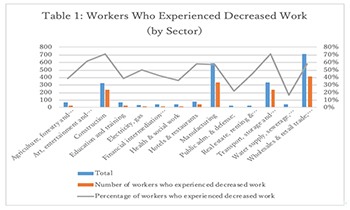
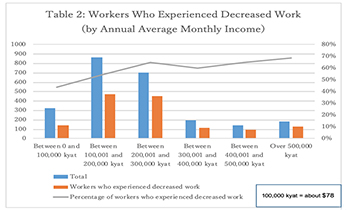
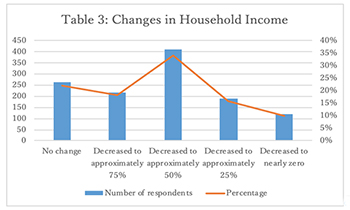
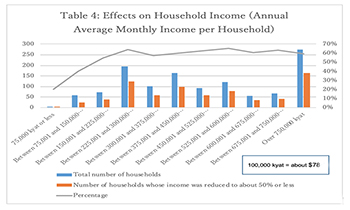
The distribution of workers by sector in the present survey is shown in Table 1, with approximately 29 percent in the wholesale and retail industries, approximately 24 percent in the manufacturing industry, and 14 percent in the construction and transportation industries respectively. While no workers reported losing their jobs, the overall rate of people who experienced decreased work was 58 percent, with approximately 58 percent in wholesaling and retailing, 57 percent in manufacturing, and 71 percent in construction and transportation experienced decreased work.
It was also clear that economic activity was affected by COVID-19 in a wide range of sectors, including hotels and restaurants, in which, 58 percent experienced decreased work. It is believed that the recovery has not been sufficient yet, being greatly affected by restrictions on movement and lockdowns beginning in April. The impact by worker income level (annual average monthly income) is shown in Table 2, and all workers were affected regardless of income level.
In terms of household income, after COVID-19, as much as 60 percent of households saw income decline to 50 percent or less (Table 3). It should be noted that while there is no significant difference in the impact by income among households with an income of 150,000 or more kyat per month (Table 4), households with lower incomes are considered to have seen a greater impact on their lives even if their income decreased to the same 50%.
In response to the question of whether adequate nutrition can be maintained in a situation where incomes are declining, approximately 30% of households find it difficult or somewhat difficult, while approximately 50% chose to reduce food expenses. As for house rent and school attendance, about 80% (Table 5) and a little more than 70% (Table 6) thought house rent payments and school attendance, respectively, were difficult or somewhat difficult. Therefore, it is believed that providing support to ensure opportunities for school attendance and to contribute to safe housing will meet the needs of residents. Unless these issues are addressed in a timely and appropriate manner, they can have a long-term negative impact.
Regarding the arrival of a second wave of COVID-19, 40% said they “don’t know,” while 40% believe "one will never come" (Table 7). Also, about 70% said household incomes would recover within six months. On the other hand, as the number of infected people is increasing in Myanmar at present and some lockdown measures are being implemented again, when considering countermeasures, it is necessary to consider the possibility that recovery from COVID-19 may take longer.
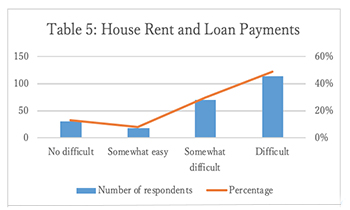
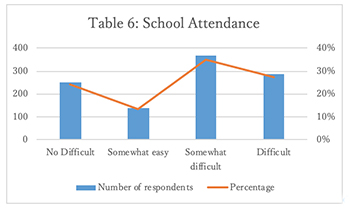
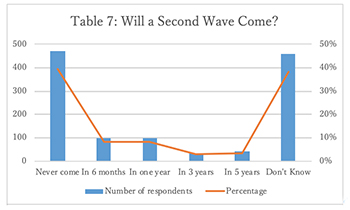
The survey found that there was a significant impact on the household level.
At present, COVID-19 infections are increasing in Myanmar. Since Sept. 10, 2020, 28 districts in Yangon has been in semi-lockdown (measures for self-restraint in going out) again. This is expected to have a further economic impact. In addition, high schools that reopened in July were closed, and the reopening of elementary, middle and high schools has not been decided on yet.
The effects of COVID-19 may include an increase in dropouts, giving up on advancing to higher level schooling, and leaving home, which may have a negative long-term impact.
In addition to the assistance provided thus far, it would be useful for the Government of Myanmar to consider and implement necessary measures, anticipating longer-lasting impacts of COVID-19.
In doing so, it will be important to expand support for more vulnerable households and provide prompt and appropriate support based on a wider range of data, including school attendance and housing. One way to collect data is to use systems that have strong ties to households, such as schools and communities.
Note: This paper expresses the individual views of the author, not the views of JICA nor of the JICA Ogata Sadako Research Institute for Peace and Development.
References
The Asia Foundation, DaNa Facility, UKAID, Myanmar Business Environment Index COVID19 Impact on Businesses: A Survey June 2020 (June 2020)
The World Bank, Myanmar Economic Monitor June 2020
Download

事業事前評価表(地球規模課題対応国際科学技術協力(SATREPS)).国際協力機構 地球環境部 . 防災第一チーム. 1.案件名.国 名: フィリピン共和国.

事業事前評価表(地球規模課題対応国際科学技術協力(SATREPS)).国際協力機構 地球環境部 . 防災第一チーム. 1.案件名.国 名: フィリピン共和国.

事業事前評価表(地球規模課題対応国際科学技術協力(SATREPS)).国際協力機構 地球環境部 . 防災第一チーム. 1.案件名.国 名: フィリピン共和国.

事業事前評価表(地球規模課題対応国際科学技術協力(SATREPS)).国際協力機構 地球環境部 . 防災第一チーム. 1.案件名.国 名: フィリピン共和国.

事業事前評価表(地球規模課題対応国際科学技術協力(SATREPS)).国際協力機構 地球環境部 . 防災第一チーム. 1.案件名.国 名: フィリピン共和国.
scroll